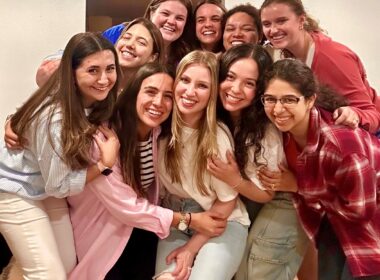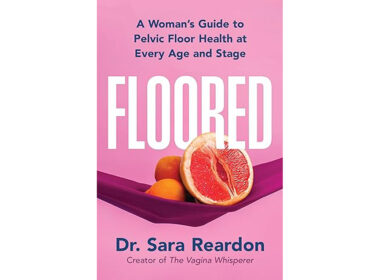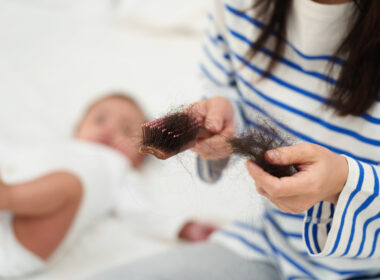Editor’s note: While fertility awareness methods (FAMs) are a useful health tool for все women of reproductive age, some of the couples who use FAMs for family planning purposes (often referred to as methods of natural family planning, or NFP) do so out of both a desire to effectively plan their families, as well as from a place of religious conviction. Couples seeking to be married in the Catholic Church, for example, often learn a method of NFP during engagement, as part of their preparation for marriage.
Melanie and Adam are a young couple who recently celebrated their 1-year anniversary in July 2025. We invited them to share a bit about their journey with fertility awareness thus far.
Their journey started with Melanie learning to chart as a single young woman, and continued through their engagement as they prepared to practice natural family planning (NFP). One year into applying NFP in the context of marriage, they have learned some important lessons they want to share with other couples considering NFP.
(The following interview has been lightly edited for clarity.)
Melanie first learned to chart as a young single woman
While most girls get their first period by the age of 12 or 13, for Melanie, the onset of menstruation occurred much later, at age 16. Four years later, as a 20 year-old single woman, Melanie learned to chart her cycle through the FEMM method, which stands for Fertility Education and Medical Management (a sympto-hormonal fertility awareness method).
Looking back, Melanie reflected on the benefits of learning to chart her cycles relatively early. “I had only been menstruating for 4 years when I was introduced to fertility awareness,” Melanie said. “I consider myself very lucky when it comes to the timing of learning about FEMM, fertility, and menstruation, because I was so early on in the lifetime of my cycles.”
The knowledge she gained from cycle charting led to a vaginismus diagnosis
She continued, “I was very happy that I charted when I was single and engaged, because if I wasn’t doing that, I never would have found out that I had вагинизм. I am so glad I learned that before I was married! I was able to find a терапевт тазового дна. I was able to learn all the stretching and the different methods and get ahead of it. It is still a problem, but it is actively being fixed.”
“I was very happy that I charted when I was single and engaged, because if I wasn’t doing that, I never would have found out that I had vaginismus. I am so glad I learned that before I was married! I was able to find a pelvic floor therapist. I was able to learn all the stretching and the different methods and get ahead of it. It is still a problem, but it is actively being fixed.”
– Melanie
Melanie continued, “I’ve seen it happen where people only learn to chart when they get engaged. Yes, charting can be used for family planning, but, even before you’re married, there are a lot of health things that go on that charting is helpful for. I feel lucky that, unlike the majority of my friends who have maybe just started charting in the last year, I have лет of data when it comes to charting my cycle, which has been helpful for engagement and marriage.”
When Melanie and Adam began talking about fertility awareness for family planning
The couple’s differences in faith (Melanie is Catholic and was already familiar with NFP; Adam is Lutheran, and was unfamiliar with NFP), made Melanie want to broach the topic early. “We talked about using NFP when we were dating,” says Melanie, “because we had denominational differences. So I was like, ‘Let me tell you about this thing.’”
The couple’s differences in faith (Melanie is Catholic and was already familiar with NFP; Adam is Lutheran, and was unfamiliar with NFP), made Melanie want to broach the topic early.
Adam chimed in, “When I first heard about [NFP], I was like ‘How effective is it?’ We were always going to be open to pregnancy and open to having kids, but ideally we wanted to wait, and I guess right when NFP was introduced or brought up, I was like, ‘Well, will that get in the way of us trying to strategically plan out when to have kids?’”
He summed up, “I was a little skeptical. I’m not going to say I accepted it right away. I had to kind of wrap my head around it.” Over time and with more education, though, “It went from ‘Is this effective?’ to ‘Yeah, we are in control of our family life.’”
Over time and with more education, though, “It went from ‘Is this effective?’ to ‘Yeah, we are in control of our family life.’”
– Adam
“During high school and college,” Adam says, “I thought birth control was normal. But then I feel like Melanie made NFP feel less foreign. And then it was almost like, ‘Oh, this feels more like what you should be doing.’ It was like a smooth landing after that.”
This is why they wish NFP education had been mandatory during their engagement
Melanie observed, “I know that some [Catholic] dioceses require engaged couples to go through an NFP class together. Our diocese didn’t require us to do anything. They handed us a pamphlet, and that was it.”
Melanie continued, “Because learning fertility awareness and deciding on an NFP method can be very overwhelming, if you don’t have someone guiding you, I’m not sure how someone learns how to [chart]. You would have to go through some sort of course.” (NB: Melanie is right. Learning a method from a подготовленный инструктор is crucial for successfully utilizing NFP for pregnancy avoidance, in particular. And it can also help you get pregnant faster, when you’ve discerned the time is right for that.)
Melanie opined, “Looking back, I do wish that the diocese required couples to go through an NFP course so they’d know it. I don’t regret that we didn’t [have to take a course] solely because we were already informed. It wouldn’t have been anything new for us.”
Getting over their fears, and gaining confidence in NFP
“I will say,” Melanie acknowledged, “there was probably a healthy amount of fear that we had prior to marriage. It was just that I’d never charted with, for lack of a better term, a consequence.”
Adam concurred, “[It felt like] high stakes.” Without having gone through a formal NFP course himself, and relying on the knowledge Melanie had gained through FEMM, Adam said, “It really helps that [Melanie] was so on top of things.”
Despite his lack of training in the method himself, Melanie’s experience and confidence in charting her cycles helped Adam get onboard with using that knowledge for family planning. He said, “It wasn’t like Melanie [on a whim] said, ‘Hey I’m going to try this and see how it goes’ it was like, ‘This is what I’ve been doing, this is how it is going to benefit both of us, this is why it helps me, and why I believe in it.’ So that helped make it easier for me.”
Over this past year, Melanie and Adam have learned a lot about taking responsibility for their совместная рождаемость. Adam explained, “Initially, I kind of felt bad, like [this family planning method] is kind of on her. She’s the one charting. If she makes a mistake, we could end up with an unplanned pregnancy. It kind of felt like it was all on her when it shouldn’t be.”
But they both learned from this feeling the importance of the man being involved. “I would say to other couples,” said Adam, that it’s important “to make the guy part of this space, and like staying involved.” Melanie added, “We are still learning how to involve each other.”
Finding what works for them–and how that helps set expectations
Adam said, “She will tell me what stage she is at [in her cycle]. When we first started talking about NFP, she was like ‘I’ll show you my charts all the time’ and we just don’t need to really do that. Now she’ll be like ‘Oh, by the way I’m at this stage now.’ It helps that I know where she’s at in her cycle in such simplistic terms. So I don’t have to be like, ‘Oh, can we have sex today?’ I kind of know where she’s at already when she tells me. It helps us not really put sex on a pedestal because we know where we’re at.”
Practicing NFP requires ongoing open, honest communication
Melanie continued, “It doesn’t feel like a ton of pressure because—I don’t want to say because we have a healthy marriage—but I do think that it is important to discuss in engagement like ‘What do you want me to inform you about with my cycle? How involved do you want to be in the knowledge of it?’ Because I feel like I can just say, ‘I started the ovulatory stage today’ so then Adam can think, ‘in 5 or so days…’ It just offers a timeline.
Melanie continued, “It also depends on being on the same page about your goal for how disciplined you want to be [with the NFP ‘rules’]. For us, on the structure side, Adam is finishing grad school. We are in the process of moving. So, we are being pretty careful [about avoiding pregnancy], and that does require more communication, because that equals less available days [for intimacy].”
“It also depends on being on the same page about your goal for how disciplined you want to be [with the NFP ‘rules’]. For us, on the structure side, Adam is finishing grad school. We are in the process of moving. So, we are being pretty careful [about avoiding pregnancy], and that does require more communication, because that equals less available days [for intimacy].”
– Melanie
Emotional vulnerability is key to practicing NFP within marriage
Melanie advised, “I think it’s important to know that you can be emotionally vulnerable with your spouse about natural family planning. I know for myself, I had a lot of moments of fear because I was like, ‘What if I mess this up? What if things don’t go the way we want?’ and I remember once, we were on a walk and I was just like, ‘Oh, I’m so nervous!’ just going on and on and on, and I remember you [Adam] were like, ‘If God wanted us to have a baby, and we were pregnant and we weren’t trying then, I mean, that’s just what was supposed to be.’”
Melanie acknowledged, “And if you don’t have that kind of foundation prior to marriage, I don’t really think NFP can be well executed because that [trust is] the foundation. You have to be okay with God guiding your life, to surrender to Him. You can do everything you can, but at the end of the day, that’s the point. It’s giving this [combined fertility] to Him and being okay with that. So having that emotional vulnerability, I think, is very key prior to marriage.”
What they know now about practicing NFP that they wish they’d known earlier
Melanie answered, “I just needed to trust myself. In my experience, it is actually very hard to mess this up—it is actually a lot harder [to mess up] than I thought. You know when you are not available [when trying to avoid pregnancy]. It’s pretty obvious. I wish I had known people closer in age to me who had done it [practiced NFP to postpone pregnancy in marriage] who could have told me, ‘Yes. This works. It’ll be fine.’”
Melanie answered, “I just needed to trust myself. In my experience, it is actually very hard to mess this up—it is actually a lot harder [to mess up] than I thought. You know when you are not available [when trying to avoid pregnancy]. It’s pretty obvious. I wish I had known people closer in age to me who had done it [practiced NFP to postpone pregnancy in marriage] who could have told me, ‘Yes. This works. It’ll be fine.’”
Having years of charting her cycle prior to marriage helped reassure Melanie about the reliability and effectiveness of NFP. Prior to charting her cycles and practicing NFP, “All I knew were people who got married and got pregnant right away and I was like ‘What!? What is happening!?’ But now I’m like, okay, either A) they разыскивается that to happen or B) they just kind of threw caution to the wind, and that’s also fine… But it freaks everyone else out.”
(NB: Couples’ experience with fertility tracking can vary in complexity, depending on the woman’s cycle, and it is also true that sometimes more guidance is needed to ensure accuracy and effectiveness. This is why Natural Womanhood always recommends learning an evidence-based method of fertility awareness or natural family planning from a trained instructor. It’s also important to remember that NFP is not birth control; a couple’s family planning intentions are deeply personal, and the decision to avoid or achieve pregnancy, or to simply “throw caution to the winds,” can vary from cycle to cycle. And, in our estimation, this is overwhelmingly a feature of NFP, not a bug.)
What they want newly engaged couples to know about practicing NFP
Melanie urged, “For engaged couples, make sure you are nurturing other parts of your relationship at the same time. This is especially important in the first year of marriage, because you really are learning a lot about each other in a lot of good ways. Don’t put too much pressure on [the sexual] part of your relationship. It is sacred and special, but there’s also many other things that deserve just as much time and attention.”
She elaborated, “Practicing NFP and being married, sex is such a small part of your marriage, overall. Not in a bad way, but I don’t know, it’s like really hyped up in Christian culture because you’re waiting to do something and then [in marriage] you’re like, this is great! But also, there’s so many other things I love about being married.”
Catholics and Christians aren’t the only ones interested in (or who can benefit from) NFP
For his part, Adam shared, “I would say, my advice to people who aren’t even engaged or religious, is that [practicing NFP] is just a healthy lifestyle to have in general. I have one cool story, I guess. I was at a pool with a friend and he’s not religious or anything but I remember somehow the topic of birth control got brought up. This was when Melanie and I were engaged, and my friend said something about birth control, and I think I kind of said, without even thinking, ‘Oh, Melanie’s not on birth control. We will do Natural Family Planning when we’re married.’ And my friend [was] like ‘What!? That is so cool. Melanie just gained so much respect.’ He said he’d recently read an article about how bad birth control is for women. I was blown away. I would never have guessed [he would have] that reaction.”







